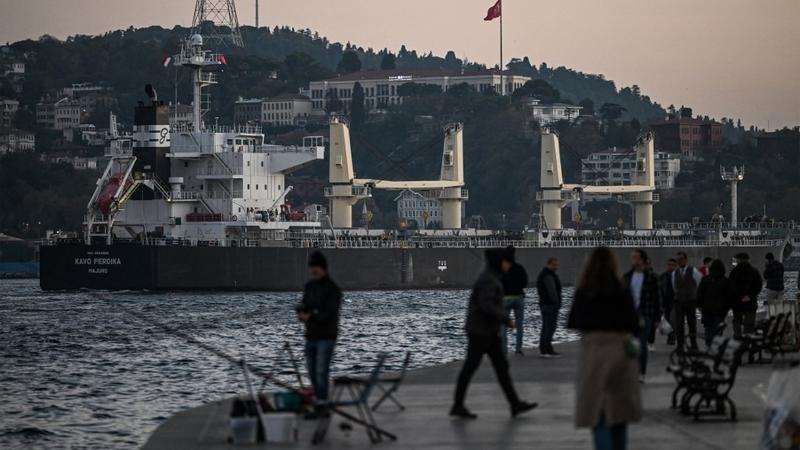 Kavo Perdika, a cargo vessel carrying Ukrainian grain, sails on Bosphorus to Marmara sea, in Istanbul, on Nov 2, 2022. (OZAN KOSE / AFP)
Kavo Perdika, a cargo vessel carrying Ukrainian grain, sails on Bosphorus to Marmara sea, in Istanbul, on Nov 2, 2022. (OZAN KOSE / AFP)
ROME — A price cap on Russian seaborne crude recently agreed by the European Union (EU), the Group of Seven (G7) nations and Australia came into effect on Monday.
Whether the move will prove effective largely depends on market response, observers have noted. However, with opposition from Russia, the price cap could trigger growing instability in the market, slowing oil production and even further exacerbating Europe's pain inflicted by the energy crisis and soaring inflation, they said.
While Europe is struggling with an ongoing energy crisis, surging inflation and risks of recession, there is also fear that the price cap against Russia might backfire on the European economy
READ MORE: IEA: Europe could risk gas shortage in 2023
LIMITED EFFECT
The price cap prohibits participating countries from providing the services that allow Russian oil to be shipped by sea if the price rises above 60 US dollars per barrel, such as insurance and finance. It is aimed at reducing the revenues Russia earns from oil and stabilizing global energy prices, the European Commission said.
The deal does not have an impact on crude oil that was loaded onto ships before the price cap came into effect Monday. A further cap on refined petroleum products is set to kick in on Feb 5, 2023, according to the European Commission.
However, the immediate impact of the price cap was limited. Crude oil futures surged and then retreated in unusually heavy trading Monday, and finished the day more or less even with Friday's close. Prices rose 2.6 percent during trading Monday to 82.64 dollars, but were down at 78.61 dollars at the end of the day.
READ MORE: EU tells countries gas price cap would come with risks
"This move has been set in stone for the last several weeks, so markets were not surprised," Massimo Nicolazzi, a senior advisor for the Energy Security Program with the Italian Institute for International Political Studies (ISPI), told Xinhua.
According to media reports, companies based in the G7 -- Britain, Canada, France, Germany, Italy, Japan, and the United States -- insure a large share of the world's maritime cargo. The 27-nation EU bloc and Australia also host many of the world's busiest cargo ports.
"The main countries involved in the agreement already had an embargo against Russian oil," Nicolazzi said. "At least for now, there is little additional impact from the steps being taken."
Phuc-Vinh Nguyen, an energy policy research fellow at Paris-based Jacques Delors Institute, was cited by media reports as saying that the reaction of the Organization of the Petroleum Exporting Countries (OPEC) and buyers on the international market "will be crucial."
OPEC and its allies, known as OPEC+, on Sunday agreed to stick to its oil output target despite Western countries' announcement of the price cap on Russian oil, reaffirming its previous ministerial meeting's decision to cut production by 2 million barrels per day from November until the end of 2023.
READ MORE: OPEC cuts 2022, 2023 oil demand growth view
Russian Deputy Prime Minister Alexander Novak has pointed out that Russia would not supply oil to countries that would set a price ceiling, neither at 60 dollars per barrel nor at any other price, and that such restrictions are interference in market instruments.
LAYER OF PRESSURE
The West's price cap increases the risks of Russia reducing its oil production, thus pushing prices of crude oil higher and creating instability in the markets, experts said.
Russia is the world's second-largest crude oil exporter, after Saudi Arabia. Novak was quoted by Sputnik on Tuesday as saying that Russia "may have situations related to periods of oil production decline," though not in large volumes.
READ MORE: Official: Russia could cut oil output given Western price cap
Germany-based Commerzbank has recently forecasted that the price cap combined with EU's import ban on Russian seaborne crude oil could lead to a "tightening on the oil market in early 2023," and that Brent oil price could jump back to 95 dollars per barrel, media reports said.
Igor Yushkov, an analyst of Russia's National Energy Security Fund, noted that Russia has made it clear that it will not export oil to countries that enforce price caps. With major oil producers' decision to maintain production cut targets, global supply will be further tightened, which will push oil prices to surge, possibly even to 120-150 dollars per barrel.
Konstantin Simonov, director-general of the National Energy Security Fund, said the price cap is a mechanism to fight suppliers. Instead of thinking about curbing energy hunger, the initiating countries have created pressure for the global energy market and risks of chaos, Simonov said.
Meanwhile, the move is seen by many as raising the stakes in an already tense situation surrounding the Ukraine crisis.
READ MORE: EU biggest loser in Russia-Ukraine conflict
"This adds a new layer of pressure," Javier Noriega, chief economist with Milan-based investment bank Hildebrandt and Ferrar, told Xinhua. "One side says it's too much and the other says it's not enough."
While Europe is struggling with an ongoing energy crisis, surging inflation and risks of recession, there is also fear that the price cap against Russia might backfire on the European economy.
The European Commission's autumn forecast predicted falling economic output in the last quarter of this year and the first quarter of 2023, saying that most EU countries will be in recession in the fourth quarter this year.
"The West's proposed price cap on Russian oil is no magic weapon," The Economist magazine said in its recent issue. "Sanctions and embargoes are flawed weapons and they have a limited shelf-life."



